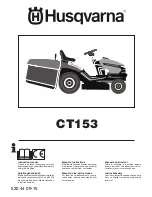
5-10
4181384 First Edition
HYDROSTATIC POWER TRAIN
5
Field Test Procedures
When a hydraulic system failure occurs, some simple
effective tests can be performed prior to performing an
test instrument. The results of these tests can lead you to
the suspected component failure. More extensive test
procedures, using test instruments are presented later in
this section. (See “Instrument Test Procedures” on
page 5-11.)
Preliminary Checks
Perform the following checks prior to beginning any tests.
1.
Check the hydraulic oil reservoir for proper fluid level,
the presence of air or water, and unusual odor.
2.
Check all lines and fittings for leaks. Tighten as
needed.
3.
Eliminate all mechanical issues prior to starting
hydraulic tests.
Charge Pump Test
The charge pump supplies oil for charging the traction
circuit and traction pump.
If faults exist in the charge pump, proceed with an
instrument test for the charge pump. (See “Cutting
Unit/Charge Pump Test” on page 6-31.)
Traction System Test
NOTE
Be sure tow valve is closed before beginning traction
system test.
1.
Operate hydraulic system until oil temperature is at
120—150°F (49—65°C).
Figure 5-6
2.
Install wheel restraints (1) to both front wheels.
3.
Lower the cutting units and move throttle lever to full
throttle. Slowly push the traction pedal forward.
Does the engine labor or stall?
YES
The traction pump is not faulty.
NO
A fault exists in the hydrostatic drive circuit,
including the traction pump or wheel motors.
Proceed to instrument test. (See “Instrument
Test Procedures” on page 5-11.)
Rear Wheel Motor Test
The wheel motor case drain is used to return excess or
bypassed hydraulic oil to the hydraulic tank.
1.
Operate hydraulic system until oil temperature is at
120—150°F (49—65°C).
2.
Stop the engine and remove the ignition key.
3.
Remove the case drain hose from the wheel motor.
Immediately plug the hose.
4.
Position a drain pan (minimum capacity 1 gallon
(3.8 L) near the wheel motor.
5.
Install a separate hose on the case drain fitting and
place the free end in the container.
NOTE
When testing rear wheel motor, put wheel restraints on
the rear wheel, and raise the front of the machine with a
chain hoist or floor crane so the wheels are off the
ground.
6.
Install wheel restraint. (See figure 5-4)
7.
Start the engine and place the traction pedal in the
forward position for 15 seconds.
8.
Stop the engine and remove the ignition key.
9.
Measure the amount of oil collected from the case
drain. Amount x 4 = amount per minute.
Is the oil measured less than 1 gallon per
minute?
YES
The motor is not faulty. Proceed to
instrument test. (See “Instrument Test
Procedures” on page 5-11.)
Is the oil measured more than 2 gallons per
minute?
YES
The motor is faulty, repair or replace as
needed. (See “Front Wheel Motor” on
page 5-25 or “Rear Wheel Motor” on
page 5-36.)
TN1329
1
Summary of Contents for AR3
Page 1: ...AR 3 TR 3 Trim Mowers Technical Repair Manual AR30001 AR30002 TR30001 TR30002...
Page 3: ......
Page 7: ......
Page 9: ...1 2 4181384 First Edition SAFETY 1 Page Intentionally Blank...
Page 19: ...1 12 4181384 First Edition SAFETY 1...
Page 33: ...2 14 4181384 First Edition SPECIFICATIONS AND GENERAL INFORMATION 2 Page Intentionally Blank...
Page 73: ...4 16 4181384 First Edition ELECTRICAL 4 Page Intentionally Blank...
Page 85: ...4 28 4181384 First Edition ELECTRICAL 4 Page Intentionally Blank...
Page 147: ...4 90 4181384 First Edition ELECTRICAL 4 Page Intentionally Blank...
Page 200: ...HYDRAULICS 4181384 First Edition 6 9 6 Page Intentionally Blank...
Page 249: ...6 58 4181384 First Edition HYDRAULICS 6 Page Intentionally Blank...
Page 251: ...7 2 4181384 First Edition STEERING 7 Page Intentionally Blank...
Page 264: ...STEERING 4181384 First Edition 7 15 7 Page Intentionally Blank...
Page 265: ...7 16 4181384 First Edition STEERING 7...
Page 311: ...8 46 4181384 First Edition CUTTING UNITS 8 Page Intentionally Blank...
Page 331: ...9 20 4181384 First Edition ACCESSORIES AND MISCELLANEOUS REPAIR 9 Page Intentionally Blank...
Page 340: ......
Page 342: ......
















































